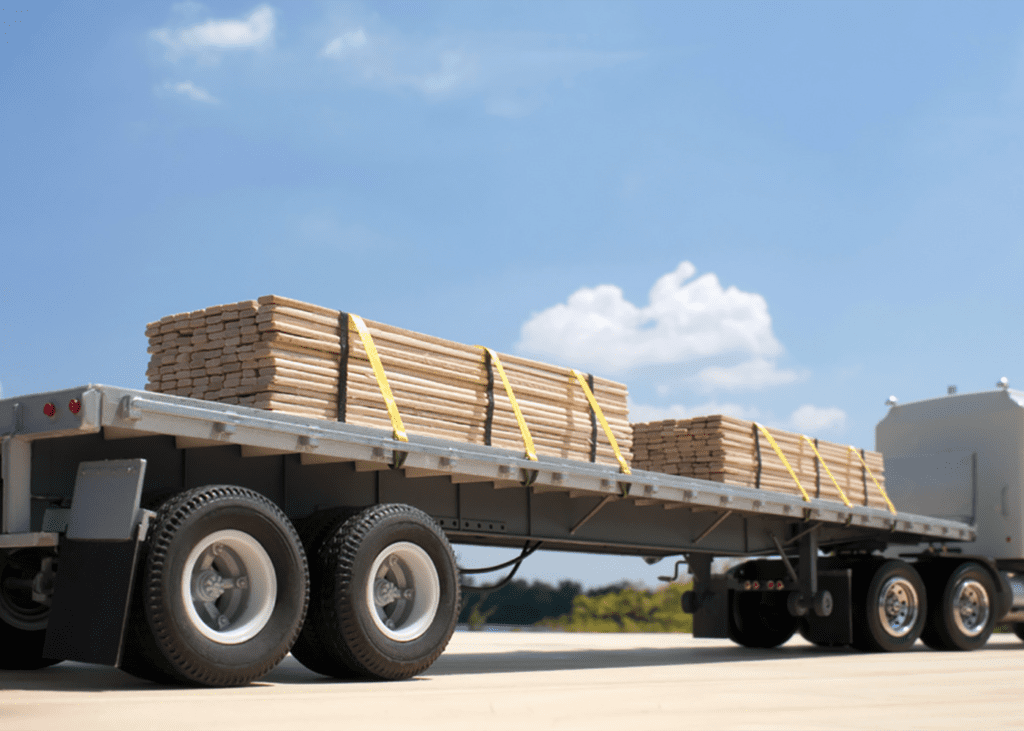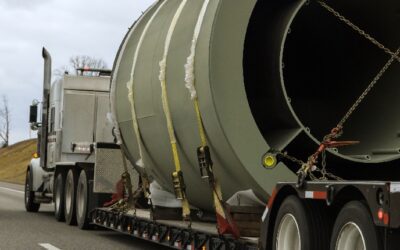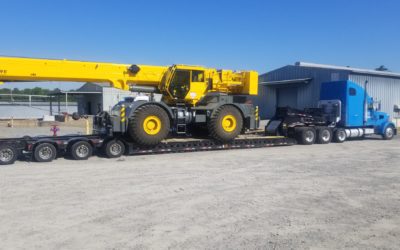Flatbed Shipping: Frequently Asked Questions
Many companies can benefit from flatbed shipping. It is a flexible, cost-effective, and versatile shipping method. In fact, flatbed shipping has actually stepped into the spotlight in the logistics industry in recent years! Because of this, it is becoming increasingly popular for businesses to seek out flatbed shipping for many of their needs.
So, what’s everyone obsessed about? Why is flatbed shipping the next big thing? Below, we’ll be answering frequent questions regarding flatbed shipping. Further, this blog will also aim to give you a general overview of what flatbed shipping is.
What is Flatbed Shipping?
Flatbed shipping is the transportation of choice for cargo that cannot be loaded or unloaded onto a dock. Because of this, it’s suitable for cargo that has unusual dimensions or shapes that don’t fit into traditional trailers.
Here’s how it works. Cargo is secured on a flat platform attached to the back of a truck in open-space. Because there are no walls, cranes and forklifts can lift heavy and unusual cargo onto the flatbed from every angle.
What Is a Flatbed Trailer?
A flatbed trailer is a type of shipping equipment that is open-deck with a large plank bed. Flatbed trailers are between 48 to 53 feet in length and 9 to 10 feet in width. Finally, flatbed trailers can carry cargo up to 48,000 lbs. As mentioned, flatbed trailers have no roof or walls at all. Typically drivers don’t like to max out their trailers on weight because it increases cost of gas and puts on a lot of wear & tear.
Irregularly dimensioned cargo may still be shipped via flatbed, but require special accommodations. But, these oversized cargo costs more. In the next section, we’ll look at different types of flatbed trailers.
What Are the Different Types of Flatbed Trailers?
Here are some common flatbed trailers, along with what each is most suitable for:
- Legal flatbed trailer — This is the typical flatbed trailer, with all the dimensions described in the earlier section.
- Step deck trailer — Step deck trailers have a bottom and top deck. With that, these trailers can accommodate cargo that the typical flatbed can’t.
- Lowboy trailer — Lowboy trailers have even lower beds when compared to the typical flatbed or step deck trailer. Being such, the design of the trailers supports very tall equipment that exceeds the typical height restrictions mentioned earlier.
- Conestoga trailer — These trailers are specialized because they come with a hard shell and an effective tarping system. With these added features, fragile and valuable cargo have higher levels of protection.
- Removable gooseneck trailer — This trailer can carry cargo up to 150,000 lbs. Further, the trailer can detach and drop to the floor, creating a ramp that the cargo can easily be removed from.
What Can Be Hauled On a Flatbed?
Flatbeds are versatile and can almost haul anything. These are common cargo types:
- Large equipment (plows, tractors, dozers, excavators, etc.)
- Mining and drilling equipment
- Construction material (lumber, steel beams, trusses, scaffolding, etc.)
- Oil, gas, and petrochemical equipment
- Electrical transformers
- Commercial heating and air conditioning units
- Solar panels and wind turbines
- Landscaping material
- Mobile and manufactured homes
- Any other freight
If you aren’t sure if your cargo can be hauled on our flatbeds — give us a call! Don’t worry, we don’t bite. We’re happy to help!
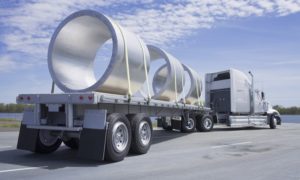
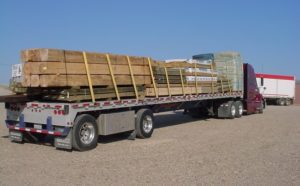
What Industries Use Flatbed Shipping?
Flatbed shipping spans across all industries. After all, what companies don’t need to ship cargo? We can’t think of any.
These are some industries that flatbed shipping includes:
- Mining and drilling
- Housing
- Construction
- Agriculture
- Renewable energy
- Landscaping
- Automotive
- Military
- Manufacturing
- Towing
How Are Flatbed Shipping Rates Calculated?
There is no universal flatbed shipping rate. Not only do different companies charge different rates, but there are other factors too. Being such, it’s important to look at the factors to get an estimate of what you are paying. Factors include:
- Distance between loading and unloading
- Special equipment to load and unload cargo
- Permits or fees that your cargo may require
- Legally permitted routes
- Specific time of year
- Type of flatbed you need
- Further accommodations (e.g. tarping, chains, etc.)
- The weight and size of your load
- Location of the transport routes
Expect to pay 2 to 4 dollars per mile. As a rule of thumb, the west of the country has the lowest rates while the East Coast has the highest rates.
What Are the Benefits of Flatbed Shipping?
Flatbed shipping provides many benefits that can ensure ease, affordability, and versatility.
With a flatbed trailer, there are no roofs or walls. Therefore, it ensures dimensional flexibility and additional storage. This comes into play when we look at convenience and cost.
Size, shape, and height are rarely issues for flatbed shipping. That’s flatbeds are more spacious than regular trailers. Flatbeds allow you to pack more cargo on the same shipments. This cuts costs by not forcing you to separate your cargo into two or more shipments. Plus, cargo gets delivered quickly!
What Cargo is Not Suitable for Flatbed Shipping?
There are some disadvantages to flatbed shipping. Therefore, make sure to consider them. Common disadvantages include a lack of protection from natural elements like rain, snow, wind, and debris.
Without walls or a roof, cargo securement and balance are also major concerns that you will need to consider when deciding how to ship your cargo.
Though not likely, flatbed shipping has also led to accidents. Cargo is dropped mid-transportation during these accidents. Being out in open space, thefts may also strike. However, these problems are unlikely to happen when you work with professionals. After all, professionals practice the latest industry standards and know how to properly secure your cargo.
What Questions Should You Ask Flatbed Shipping Services?
Incorrect and/or unprofessional flatbed shipping can lead to catastrophic outcomes. Even if your cargo is insured by the shipping service, damages to your cargo can be a major hassle for you and your business. After all, It can slow down business processes and cause terrible headaches. So, ask questions!
Ask questions to weed out unprofessional flatbed shipping services from professional ones. Ask these 4 questions to make your experience free of hiccups:
- Is your company properly licensed and insured?
- How many years of experience does your company have?
- What security measures does your company take?
- Does your company conduct background checks for your drivers?
Flatbed Shipping Tips
If you ultimately decide to utilize flatbed shipping for your cargo, here are some extra bits of advice from us to you. Avoid common flatbed shipping mistakes with these tips.
Know What You’ll Be Hauling
The flatbed shipping process is not complete without planning. To begin, make sure you know the dimensions of your cargo and what accommodations you may need. In addition, the monetary value of the cargo needs to be considered.
Note and measure cargo dimensions so that logistic providers can onboard your shipment faster and use the most appropriate trailer. Further, the dimensions will help you abide by local and national laws.
Secondly, know the necessary accommodations you want beforehand. This ensures that the company has the necessary tools to satisfy those accommodations. Do you need tarps? What about coil racks? Ask these questions to yourself.
Finally, know the monetary value of your cargo. This will determine if the carrier has the appropriate cargo insurance to cover potential damages or accidents.
Work With Professionals
Professionals are the way to go if you want to improve security and efficiency, while also saving money. Therefore, working with the cheapest company may backfire for you and create more costs in the long run.
We’re Ready to Lend A Flatbed Shipping Hand
Titan Worldwide’s trucking services include power only, project freight, oversize, and specialized heavy haul trucking for clients of all sizes. When it comes to flatbed shipping, we don’t slack either! We are one of America’s best flatbed transportation logistics companies. Our dedication and exemplary track record set us apart! We currently operate in all U.S. states, Canada, and Mexico.
Titan Worldwide treats your cargo like our very own.
